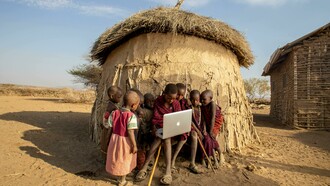The answer to this question is not univocal. In Germany, Japan and South Korea, it did happen, and they are countries that enjoy democratic legitimacy. The same has not happened in Iraq, Libya, Syria, Yemen or Afghanistan. In the first, a war was launched in 2003 led by the United States, together with an unusual coalition formed by England, Australia and Poland under false arguments: the existence of weapons of mass destruction that were never found. The country was invaded, the dictator Saddam Hussein was overthrown and executed, but neither democracy nor economic development have arrived in a context of religious and cultural fractures between Shiites, Sunnis and Kurds. Years later, the so-called "Arab Spring", launched in Tunisia in 2011, had a "social butterfly effect", toppling governments, threatening autocracies, and hitting authoritarian regimes in the region.
In Libya, the powerful NATO with France at the helm led attacks and bombings in 2011 against the regime of Muammar Gaddafi, who was assassinated, unleashing civil war and instability that lasts to this day. In the Syrian case, the civil war that began that same year responded to an identical pattern driven by Washington in its geopolitical vision of defending its interests, overthrowing dictators who are not favorable to them, imposing democracy, but without touching semi-feudal governments like that of Saudi Arabia.
The difference in the Syrian case is that the regime of Bashar al-Assad has remained intact thanks to the unrestricted support of Russia, China and Iran. The participation of large and medium regional powers, together with the precarious stability of the area, have prolonged the war and destruction with more than one hundred thousand victims, razed cities and hundreds of thousands of refugees.
Yemen, with a Shiite majority, one of the poorest countries and which had achieved its unification in 1990, entered civil war in 2014. Saudi Arabia and other Arab countries, supported by the United States, England and France, began bombing the capital controlled by the Shiite Houthis, provoking one of the worst tragedies and violations of international humanitarian law, according to the United Nations. In these years, Islamist groups have gained positions, deepening the conflict, accentuating the tragedy and increasing the intervention of two of the antagonistic regional powers: Iran and Saudi Arabia.
Afghanistan, with almost 40 million inhabitants and an area like France, was attacked and militarily occupied by the United States and a small group of allied countries in 2001. The Taliban government collapsed in just two months, and one triggered by Washington was implemented. The country is made up of different ethnic groups: Pashtuns, Tajiks, Uzbeks, Turkmen, Baluchis, Baouis, Nuristanis, Hazaras and other minor ones. Although all of them are united by the Muslim faith in its different variants, the majority is that of the Pashtuns (Sunnis), who make up the Taliban, while their enemies are the Hazaras (Shiites).
In 1973 the republic was proclaimed and five years later the government was overthrown by one close to Moscow, so the then powerful Soviet Union felt called upon to protect it. It was the beginning of the military intervention and occupation, in 1979, where it ended up humiliated and defeated. It withdrew from Afghan soil in 1988 with a toll of around 25,000 dead soldiers, along with thousands of wounded and mutilated. In the 19th century, the British colonialists invaded the country twice, being defeated on the first occasion and triumphant on the second, but on both occasions, they had to leave Afghan territory.
In the framework of the Cold War in the last century, and in view of the fear of the United States of the historical expansion that Russia has always sought - as Henry Kissinger points out - Washington fostered and materially supported the resistance from the beginning and therefore who would later be his enemies: the Islamist guerrillas in their different factions that were largely trained and armed by the CIA, including Al Qaeda.
This year saw the withdrawal from Afghanistan of the U.S. and NATO occupation forces that accompanied them after 20 years that cost around 2,500 dead to the former and more than 1,000 to the latter. The world witnessed the dramatic and tragic images we have seen on television from the Kabul airport and the helplessness of millions of people, especially women, who for two decades enjoyed a space of greater personal freedom.
The military failure is accompanied by Washington's political defeat in the eyes of its allies and the countries that trust in the security it can provide. For the liberators or bearers of democracy, each situation is obviously different and so are the responses, depending on the continent, the country and the cultural diversity. The 20th century and the present one show us antagonistic realities.
In a historical framework, we can start with their opposites, i.e., the so-called "popular democracies" that flourished after the Russian revolution and its expansion after World War II (WWII) in 1945, when they were imposed in most Eastern European countries by the overwhelming advance of the Soviet Red Army on its way to liberate Berlin and liquidate the Nazi regime of Hitler and his allies. The exception was the former Yugoslavia, which managed practically on its own to expel the German, Italian and internal fascist forces and impose its own conception of democracy and socialism. Nothing of this remains today, after the disintegration of the Soviet Union and Tito's regime.
In 1990, German unification took place, followed by the democratization of the countries that made up the Warsaw Pact, the war and the disintegration of Yugoslavia into six independent countries. The end of the Chinese civil war and the triumph of Mao Zedong in 1949, or the end of the Korean War, the victory of Kim Il Sung in 1953 and the division of the country into two, were different. In Beijing and Pyongyang, dictatorships headed by the communist party were consolidated with a particular vision of the concept of democracy, while in Seoul, after fierce military governments and a long presence of US troops that persists, it evolved into a democratic political system.
In what were once West Germany, the Japanese empire or today's South Korea, democracy was also imposed by force of arms and occupation of the territory by the victorious forces in World War II, consolidating itself as a way of life, despite the great cultural differences and, in the case of the latter two countries, never having known a political system of that nature. Germany went from being a victorious empire after unification in 1871 to an expansionist and militaristic monarchy until its defeat in World War I in 1918, which gave way to the Weimar Republic. There, a constituent assembly was developed while in Berlin a real civil war was unleashed between the hard left and the extreme right.
In Weimar a revolutionary constitution was born, unprecedented for the time, where universal suffrage, the vote for women, freedom of religion and press, among many others, were contemplated. This lasted only 14 years, until 1933, when democracy collapsed and Hitler imposed the Nazi dictatorship, until the liberation, in 1945, the occupation and division of Germany into two countries with opposing political systems where Western democracy was imposed with the fall of the wall and subsequent unification.
In Japan, with a millenary culture, an empire also developed from the second half of the 19th century, known as the Meiji period, based on the worship of the emperor and the Shinto religion, as well as the loss of the feudal power of the samurai as the only military force. The rapid development of the war industry and its economy required raw materials, so imperial expansionism led them to occupy the Korean peninsula, the Chinese provinces of Taiwan, Manchuria and other territories, until their collapse and surrender with the two atomic bombs dropped by the United States, which resulted in the occupation of the country for seven years, the loss of its colonies and a new constitution - drafted by the Americans - which imposed a democratic political system that, despite the fact that they had never known it before, was consolidated until it became a world economic power.
Part of the success lay in the political decision not to try the emperor and those mainly responsible for the war, because of the adoration felt by the Japanese. In the case of Korea, with a millenary Confucianist culture, with historical nuances obviously, it followed the path of seeking westernization at the end of the 19th century and established an empire that would last less than a decade. It ended in 1905 with the signing of the Treaty of Portsmouth, which sealed the peace after the Russo-Japanese war and handed Korea over to the latter, who ended up occupying it in 1910. Japan's presence ended with its surrender in 1945.
Subsequently, the Korean War (1950-1953) would begin, splitting the peninsula at the 38th parallel into two countries and extending to the present day. While the north is supported by China, it maintains a one-party system, with the first communist hereditary dynasty and the so-called "people's democracy" that restricts all individual freedoms. The south is today, under the American umbrella and after successive dictatorships, democracy and economic power.
Former U.S. Secretary of State Condoleezza Rice pointed out that in countries such as Germany, Japan and South Korea, which were ruled by tyrannies and then liberated by allied troops, regimes based on representative democracy and freedom were established. He added that this occurred even though the latter two never knew democracy, but today, after a long road, they have consolidated a successful democratic system. That was the conception that prevailed under the presidency of George Bush Jr. - after September 11 - to launch the punitive war in Iraq and subsequently set fire to a large part of the region: the conviction that the overthrow of dictatorships and the US military presence would bring about the consolidation of the democratic system and economic development. This has not happened and Afghanistan, after 20 years of occupation, is proof that the use of so-called hard power is not enough in societies as culturally diverse as Muslim societies. Having ignored the historical, ethnic, religious and cultural roots, or the very complexities of Islam and its variants, putting immediate political interests first, has been the mistake of the United States and the Western powers, from Iraq to Afghanistan, just as the Soviets were wrong in the past.
The transformation of the United States into the world's leading power after World War II was not accompanied in subsequent decades by the wisdom and prudence of its politicians, who abused hard power and suffered major military defeats, as was the case in Southeast Asia. The overthrow of democratic governments by the CIA in Iran, Chile and other countries generated dictatorships that have only damaged the U.S. image in the world. The same happened with the intelligence failures and breaches of its national security with the Al Qaeda terrorist attacks on symbols of economic, military and political power in New York and Washington, which required lengthy planning. The response was again the use of force without knowing well whom to attack, to end up starting a war and occupying Iraq and Afghanistan, convinced that with it would come peace and stability.
As happened in Vietnam, Laos and Cambodia, billions of dollars have been spent to leave tons of abandoned weapons and hundreds of thousands of victims, proving wrong the hypothesis that military occupation would bring democracy as it had happened in other places. Cultural complexities have been a great barrier to the defeat of Islamist forces. Poorly equipped guerrillas - compared to US and NATO soldiers - have been impossible to defeat, as was the case with the French and Americans in Vietnam.















